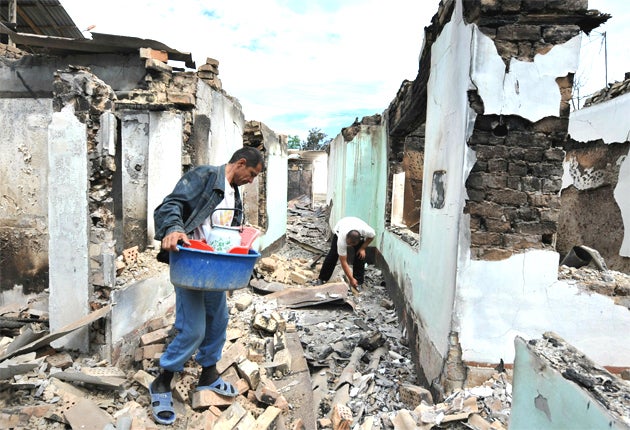Uzbek men: 'We need peacekeepers, otherwise there will be a sea of blood'
Those remaining in Osh are ready to fight to defend their homes from Kyrgyz mobs. Jo Lillis reports from the city

In the damaged city of Osh, the only Uzbeks to be found were men. They had sent away the elderly, the women and the young to the border with Uzbekistan and remained behind to defend their homes against marauding Kyrgyz mobs they blame for attacks that have left at least 189 dead. They were waiting – they were not sure if it was for help, or another attack – and they were afraid.
"No one's defending us; we need UN peacekeepers, otherwise there will be a sea of blood," said Khamidjon, a middle-aged Uzbek man, who had gathered with about 45 of his ethnic kin in the so-far undamaged railway neighbourhood of the city. "Supplies are running out, humanitarian aid is not reaching us."
Violence erupted here last Thursday between the majority Kyrgyz population and Uzbeks, and spread to surrounding regions, prompting more than 100,000 ethnic Uzbeks to race for their lives to Uzbekistan. Tens of thousands more are camped on the Kyrgyz side of the border.
Several tanks rolled through the city of Osh yesterday and soldiers manned checkpoints at the airport and on the road to the border to try to prevent further attacks on the Uzbek population. But the Uzbeks, who accuse the troops of being complicit in attacks on their community, had made their own limited preparations.
Using debris that littered the city, they have built barricades to try to prevent unwanted intruders. A small group of men armed with automatic weapons is overseeing the defences of their 70 or so homes. And the rest, have built up a cache of their own weapons – a pile of rocks and stones.
Although their neighbourhood remains untouched, the surrounding streets show signs of great damage. Shops and cars have been burnt out and only a couple of small grocery shops were open yesterday.
Humanitarian aid was trickling in via Uzbekistan, though some supplies coming via Osh were reportedly intercepted and volunteers attacked.
In some streets, shops have been gutted, while hairdressers and banks next door have been untouched, suggesting targeted attacks on Uzbek businesses. Householders have daubed "Kyrgyz" in chalk or painted their gates to indicate their ethnicity and prevent their buildings being destroyed.
One Uzbek man in his early 30s, Avaz, said he escaped yesterday with the help of friends from his flat in the centre of town, a majority Kyrgyz area, where he lives with his wife and children.
"We were at home in the evening and then there was such a noise, we thought it was them playing football. Then the shooting started," he said. "There were people going around with axes and assault rifles. They took up whatever was convenient, whatever was good for killing people. We were afraid and we didn't go out. We were at home for seven days, there was no electricity for four days and there was no gas."
"We don't trust any Kyrgyz at the moment," he added.
Osh – a sprawling city of low-rise buildings, ringed by snow-topped mountains and just a few miles from the border with Uzbekistan – is divided into ethnic Kyrgyz and Uzbek neighbourhoods with some mixed areas in the centre of the city.
The attacks began in what appears to have been a local row about money, but many of the Uzbeks believe it was used as a pretext to launch co-ordinated attacks, organised by a "third side". The Kyrgyz government blames forces loyal to the former president, Kurmanbek Bakiyev, who was ousted in a bloody uprising in April.
The UN has declared that the fighting was "orchestrated, targeted and well-planned" – set off by organised groups of gunmen in ski masks.
Opinion was divided among the Uzbeks over whether their neighbours were to blame. "Local inhabitants, to whom it's advantageous to carry out marauding and get rich for free, have joined in," said one young man who wished to remain anonymous.
For now, Uzbekistan has closed its border, but at one crossing point, some women who were part of a group of about 1,000 said they had no intention of permanently uprooting and wanted to return to Osh once the situation calmed.
Odina Ashurova, from a village outside of Osh, was there with her daughter, a son and mother-in-law. Her husband and 20-year-old son had remained behind to protect their home. "I'm here to save my life. My neighbourhood is all burnt out. There are five people dead in my street alone. "Of course, I'm afraid because I've left the others there. Kyrgyz militants are killing everybody."
Like the women at the border, the men back in the barricaded neighbourhood were waiting for something to happen. They did not know what, but were not sure it would be relief. The Uzbek man Khamidjon said defiantly: "We were born here and we will die here."
Subscribe to Independent Premium to bookmark this article
Want to bookmark your favourite articles and stories to read or reference later? Start your Independent Premium subscription today.

Join our commenting forum
Join thought-provoking conversations, follow other Independent readers and see their replies
Comments